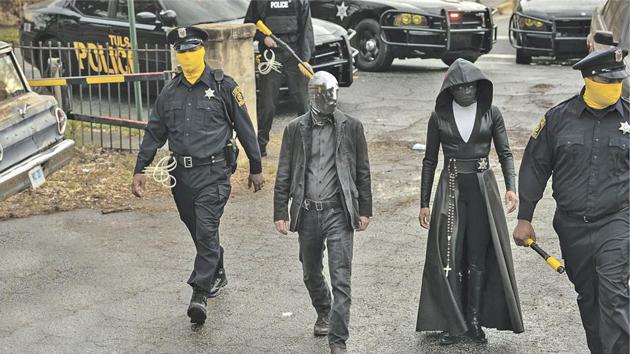Watchmen: the timeliest show about our political climate
HBO’s comic book show Watchmen is not only relevant to America, but also to any country witnessing division.
Shortly after the premiere of HBO’s Watchmen on October 20, the internet erupted in disbelief. For the black audience, the first episode highlighted a most tragic chapter in their community’s history, while the white viewers found themselves being educated about an event that few among them were aware of. Neither had expected a major comic book show to open with a recreation of a real-life, racially motivated massacre. For a brief moment, they were united.

Immediately, Google witnessed an uptick in searches for the Tulsa Race Massacre of 1921 — a shameful moment in American history that has been successfully swept under the rug over the decades. Creator of the show, Damon Lindelof, admitted that he hadn’t known about it until very recently, and his subsequent research into the incident inspired him to set Watchmen in present day Tulsa, in an alternate reality where descendants of African slaves were paid reparations by a left-leaning American government run by President Robert Redford.
“I was 43 or 44, and I wondered how could it be that I’ve never heard about this,” Lindelof told Entertainment Weekly. “Then I read more, and I said Tulsa was the right place to set the show.” An important part of the syllabus he prescribed for himself was African American essayist Ta-Nehisi Coates’ acclaimed piece for The Atlantic, The Case for Reparations, in which the Tulsa Massacre finds prominent mention.
Racism, and the often duelling reactions of different communities to a shared history is what forms the backbone of Lindelof’s Watchmen, a modern day ‘remix’ of the celebrated 1986-87 comic book by writer Alan Moore and artist Dave Gibbons. The nine-episode first season, of which three episodes have been aired on Hotstar in India, updates the Nixon-era disillusionment and paranoia of the comic for an audience that voted Donald Trump (and others of his ilk) into power. The spectre of nuclear war hung over the original story — the ticking doomsday clock has become a potent motif in the world of Watchmen — and Lindelof, faced with the challenge of retaining the comic’s provocative themes, decided that there was only one direction in which he could take his show.
“What’s the equivalent now of impending nuclear war? What’s creating the big cultural anxiety? For me, it’s the anxiety of a reckoning,” Lindelof said in an interview with The New York Times. “The identification of white supremacy as a bad guy in a superhero comic book that could not be defeated—the Klan wears masks, but why are its members never the villains in a superhero story? Those ideas felt like natural fits for Watchmen.”
In the alternate reality of the show, a white supremacist faction has misappropriated the writings of the vigilante Rorschach (who dies in the comic) to reawaken a race war. The faction, which calls itself the Seventh Kavalry, wears masks inspired by the one worn by Rorschach in the comic, and begins hunting down police officers in protest for what it perceives as preferential treatment towards the black population of Tulsa. The first episode ends with a lynching.

This is just of one of the several ways in which Watchmen transcends its American setting and becomes a show that others can relate to. Indian audiences will find the show’s themes and its depiction of a divided society, particularly a bill that affords the police blind protection in conflict zones, especially relevant.
The irony is that in the show, the Redford government has created a sort of liberal utopia; besides the reparations programme, gun control has been enacted and racial violence has been dormant for what appears to be several years. Lindelof isn’t so much trying to make a statement about our moral failings as a society — the concept of good and bad is often murky in the world of Watchmen — as much as he is implying, like Alan Moore, that we are trapped in an inescapable prison of our own making, that humanity is its own worst enemy.
Get more updates from Bollywood, Hollywood, Music and Web Series along with Latest Entertainment News at Hindustan Times.



